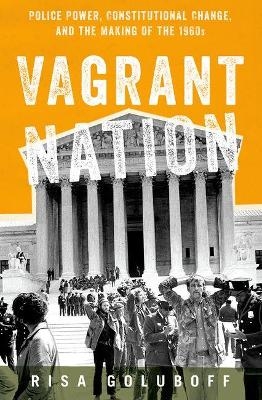
Vagrant Nation
Police Power, Constitutional Change, and the Making of the 1960s
Seiten
2017
Oxford University Press Inc (Verlag)
978-0-19-069904-8 (ISBN)
Oxford University Press Inc (Verlag)
978-0-19-069904-8 (ISBN)
In Vagrant Nation, Risa Goluboff has found a way to explain how the interaction between 1960s social movements and the courts fundamentally changed both American law and society writ large. By look at the changing views regarding a minor type of crime-vagrancy-Goluboff shows how the courts were cast directly into the midst of the turmoil sweeping the nation.
In 1950s America, it was remarkably easy for police to arrest almost anyone for almost any reason. The criminal justice system-and especially the age-old law of vagrancy-played a key role not only in maintaining safety and order but also in enforcing conventional standards of morality and propriety. A person could be arrested for sporting a beard, making a speech, or working too little. Yet by the end of the 1960s, vagrancy laws were discredited and American society was fundamentally transformed. What happened? In Vagrant Nation, Risa Goluboff provides a groundbreaking account of this transformation. By reading into the history of the 1960s through the lens of vagrancy laws, Goluboff shows how constitutional challenges to long-standing police practices were at the center of the multiple movements that made "the 1960s." Vagrancy laws were so broad and flexible that they made it possible for the police to arrest anyone out of place in any way: Beats and hippies; Communists and Vietnam War protestors; racial minorities, civil rights activists, and interracial couples; prostitutes, single women, and gay men, lesbians, and other sexual minorities. As hundreds of these "vagrants" and their lawyers claimed that vagrancy laws were unconstitutional, the laws became a flashpoint for debates about radically different visions of order and freedom. In Goluboff's compelling portrayal, the legal campaign against vagrancy laws becomes a sweeping legal and social history of the 1960s. Touching on movements advocating civil rights, peace, gay rights, welfare rights, and cultural revolution, Vagrant Nation provides insight relevant to this battle, as well as the battle over the legacy of the 1960s' transformations themselves.
In 1950s America, it was remarkably easy for police to arrest almost anyone for almost any reason. The criminal justice system-and especially the age-old law of vagrancy-played a key role not only in maintaining safety and order but also in enforcing conventional standards of morality and propriety. A person could be arrested for sporting a beard, making a speech, or working too little. Yet by the end of the 1960s, vagrancy laws were discredited and American society was fundamentally transformed. What happened? In Vagrant Nation, Risa Goluboff provides a groundbreaking account of this transformation. By reading into the history of the 1960s through the lens of vagrancy laws, Goluboff shows how constitutional challenges to long-standing police practices were at the center of the multiple movements that made "the 1960s." Vagrancy laws were so broad and flexible that they made it possible for the police to arrest anyone out of place in any way: Beats and hippies; Communists and Vietnam War protestors; racial minorities, civil rights activists, and interracial couples; prostitutes, single women, and gay men, lesbians, and other sexual minorities. As hundreds of these "vagrants" and their lawyers claimed that vagrancy laws were unconstitutional, the laws became a flashpoint for debates about radically different visions of order and freedom. In Goluboff's compelling portrayal, the legal campaign against vagrancy laws becomes a sweeping legal and social history of the 1960s. Touching on movements advocating civil rights, peace, gay rights, welfare rights, and cultural revolution, Vagrant Nation provides insight relevant to this battle, as well as the battle over the legacy of the 1960s' transformations themselves.
Risa Goluboff is the Dean of the University of Virginia School of Law and the Arnold H. Leon Professor of Law Professor of History. She is also the author of The Lost Promise of Civil Rights.
Introduction
1. From the Soapbox to the Courthouse
2. The Vagrancy Law Education of Ernest Besig
3. "Shuffling" Sam Thompson and the Liberty End Café
4. "For Integration? You're a Vagrant"
5. "Morals Are Flexible from One Generation . . . to Another"
6. "The Most Significant Criminal Case of the Year"
7. Hippies, Hippie Lawyers, and the Challenge of Nonconformity
8. The Beginning of the End of Vagrancy Laws
9. "Vagrancy Is No Crime"
Conclusion
Notes
Acknowledgments
Index
| Erscheinungsdatum | 28.09.2017 |
|---|---|
| Verlagsort | New York |
| Sprache | englisch |
| Maße | 234 x 156 mm |
| Gewicht | 730 g |
| Themenwelt | Geschichte ► Teilgebiete der Geschichte ► Kulturgeschichte |
| Recht / Steuern ► Allgemeines / Lexika | |
| Recht / Steuern ► EU / Internationales Recht | |
| ISBN-10 | 0-19-069904-3 / 0190699043 |
| ISBN-13 | 978-0-19-069904-8 / 9780190699048 |
| Zustand | Neuware |
| Haben Sie eine Frage zum Produkt? |
Mehr entdecken
aus dem Bereich
aus dem Bereich
der stille Abschied vom bäuerlichen Leben in Deutschland
Buch | Hardcover (2023)
C.H.Beck (Verlag)
CHF 32,15
eine Geschichte der Welt in 99 Obsessionen
Buch | Hardcover (2023)
Klett-Cotta (Verlag)
CHF 34,90
Titel, Throne, Traditionen
Buch | Softcover (2023)
C.H.Beck (Verlag)
CHF 27,90


